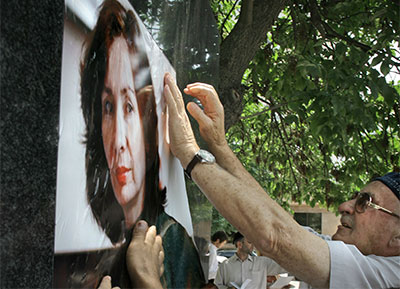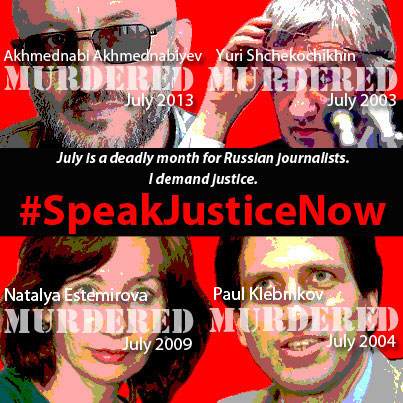Last week, I was preparing to write a column about the anniversary of Paul Klebnikov‘s murder. The American editor of Forbes-Russia was murdered contract-style nine years ago in Moscow at the age of 41. He had investigated connections between Russian business and organized crime, as well as ethnic and political tensions in Chechnya. Despite numerous official promises to solve the July 9, 2004, killing, Klebnikov’s murderers–as well whoever ordered him killed– are still nowhere near the dock.
Instead of writing about Klebnikov’s case, I was tasked with reporting on yet another deadly assault in Russia. Journalist Akhmednabi Akhmednabiyev was shot dead on July 9, 2013, outside his home in Dagestan, a volatile republic in Russia’s North Caucasus. A cardiologist by training, he built a second career in journalism and reported for independent outlets Novoye Delo and Kavskazsky Uzel.
Akhmednabiyev is the 18th journalist murdered in Russia in the past decade and the 36th since CPJ began keeping records in 1992.
As is happens, today is the anniversary of another high-profile murder: Natalya Estemirova, a prominent rights activist who contributed reporting to the Moscow-based independent newspaper Novaya Gazeta and Kavskazsky Uzel, was abducted near her house in Grozny, Chechnya, and shot dead in the neighboring region of Ingushetia on July 15, 2009. She was 50 years old. Authorities alleged that Islamist insurgents were behind the attack, an allegation which Estemirova’s colleagues declared a farce. She had reported relentlessly on human rights violations committed by federal and regional authorities in Chechnya.

While we are marking the anniversaries of journalist murders, there was another this month: 53-year-old Yuri Shchekochikhin, also a reporter for Novaya Gazeta, died on July 3, 2003, from a mysterious allergic reaction–but his colleagues believe he was poisoned. At the time of his death, he had been investigating a high-level case of corruption and bribery involving officials from the Federal Security Services (FSB) and the Prosecutor General’s Office.
There has not been a single prosecution in any of these four murders. In fact, the rate of impunity for journalist murders in Russia is nearly 90%. And, like many journalists around the world who are murdered for what they do, three of these four reported receiving threats, but continued carrying on their work. The same can hardly be said about authorities–none of the reports led to prosecution of those who made the threats.
Earlier this year Akhmednabiyev told regional authorities about death threats he received on the phone, and asked them for protection after an unknown gunman shot at his car in January. His request was denied, and authorities refused to probe the shooting incident as an attempt on his life. Now, after his murder, regional prosecutors vowed to probe the January incident.
Authorities also pledged to solve Akhmednabiyev’s murder–something we have heard many times before in the case of Russian journalist murders. We will believe it when we see it.
